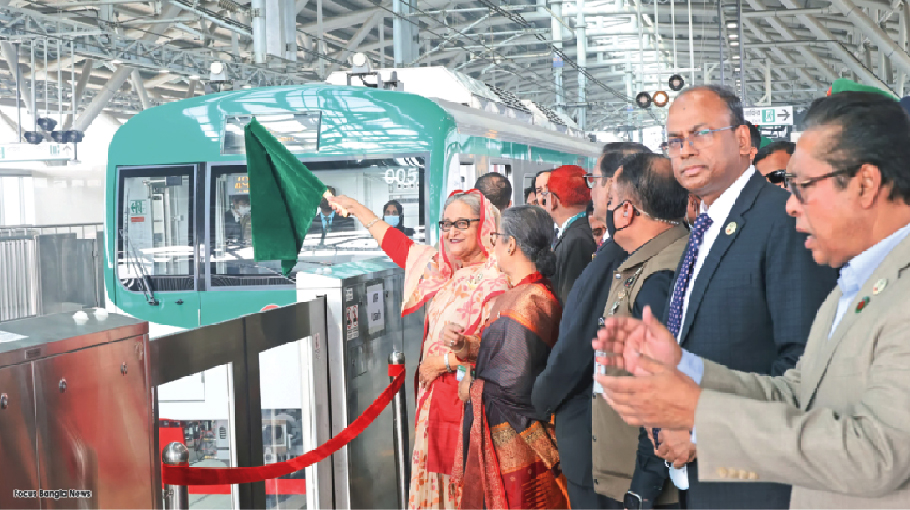Another milestone
PM flags off Metro Rail


Bangladesh enters into the new era of metro rail service with the inauguration of the first phase of the country’s first-ever electricity-powered metro rail by Prime Minister Sheikh Hasina on Wednesday.
The opening of the metro rail service for the mass people has added another milestone to the country's communication history within the span of six months after opening the dream Padma Bridge.
The metro-rail service is aimed at easing up the severe traffic snarl in the mega city of Dhaka. The metro-rail is also able to run through remote control system.
Prime Minister Sheikh Hasina, the eldest daughter of the founder of Bangladesh and Father of the Nation Bangabandhu Sheikh Mujibur Rahman, opened the 11.73 km part of the Mass Rapid Transit (MRT) Line-6 of the metro rail project from Diabari in Uttara to Agargaon by unveiling its plaque at Diabari in the city.
Prime Minister's younger sister Sheikh Rehana, among others, was also present at the function. Moreover, people from various sectors, including diplomats, Road Transport and Bridges Minister Obaidul Quader, Dhaka North City Corporation Mayor Atiqul Islam, Chairman of the Parliamentary Standing Committee on the Road Transport and Bridges Ministry Rawshan Ara Mannan, Dhaka-18 constituency lawmaker Habib Hasan, Road Transport and Highways Division Secretary A B M Amin Ullah Nuri and Managing Director of Dhaka Mass Transit Company Limited (DMTCL) MAN Siddique accompanied the premier.
The prime minister also released a commemorative bank note of TK 50 to mark the opening of the Metro Rail. Later, she addressed a civic rally at the Diabari Playground in Uttara in the capital city of Dhaka.
After the opening of the metro-rail service at 11:00 am and addressing the civic rally, the Prime Minister bought a ticket and made the first official journey by the Metro Rail from Diabari to Agargaon.
Mariam Afiza was the first operator of the metro train. The general people can travel by Metro Rail from today (December 29).
Initially, the metro train will run from 8:00 am to 12:00 noon every day from Uttara to Agargaon stations without any break.
State-owned Bangladesh Road Transport Corporation (BRTC) will operate 30 double-decker buses to transport passengers from and to metro rail stations.
Of those, 20 buses will be operated on Agargaon-Motijheel route via Farmgate, Karwan Bazar, Shahbagh and Gulistan while 10 buses will run from Uttara's House Building to Uttara's North station at Diabari via Abdullahpur.
The government-owned company DMTCL is implementing the metro rail projects.
Japan International Cooperation Agency (JICA) has been constructing the metro rail and providing soft loan for the project.
The construction work of the MRT Line-6 began in 2016.
The second section of metro rail from Agargaon to Motijheel and the third section from Motijheel to Kamalapur will be launched in phases.
The metro rail from Agargaon to Motijheel will be launched in December next year.
It will be able to carry 60 thousand passengers per hour and half a million passengers per day and the trains will arrive at each station every four minute. With metro rail Bangladesh is set to embark on a new era of commuting with a new mode of transport as it will reduce immensely the public sufferings by transporting more passengers in short time with comfort to the commuters.
Traffic congestion in the capital will be reduced after complete operation of the metro rail as it will also increase revenue collection.
According to the project details, initially some 10-set of train having six coaches will run from Uttara to Agargaon.
At each station, the train will wait until the boarding and disembarking of passengers is completed. Each train can run at a speed of 100 to 110 km with 2,300 passengers. However, the speed will be lower in areas with bends.
After assuming power in 2009, the Awami League government took various initiatives to reduce public sufferings by easing traffic congestion in the capital.


